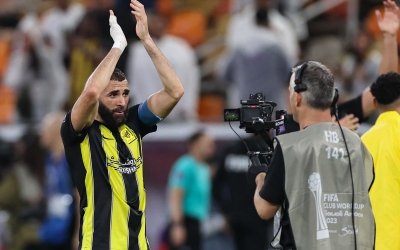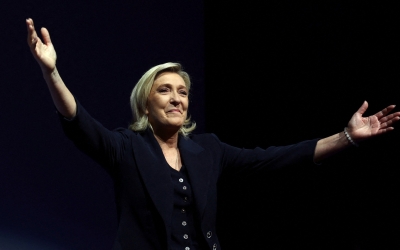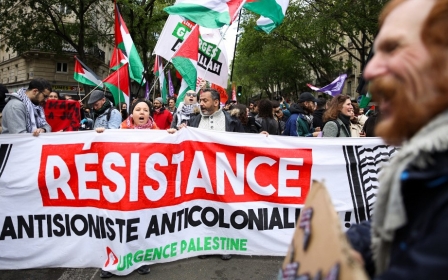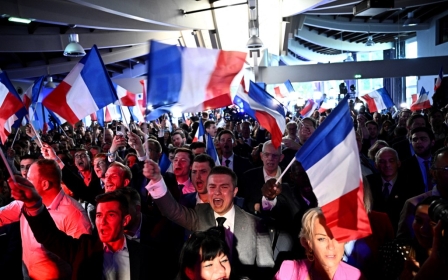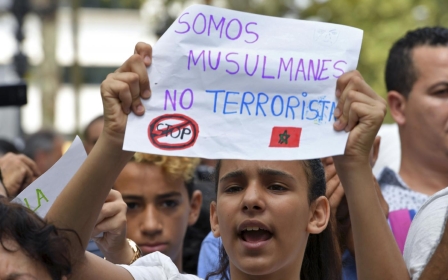France's interior minister says he 'does not rule out' banning the Muslim Brotherhood

The new French interior minister, Bruno Retailleau, has declared that he is not ruling out classifying the Muslim Brotherhood as a "terrorist" group and banning it, while advocating for the establishment of a new criminal offence to fight political Islam in the country.
In an interview published on Wednesday by media outlet Valeurs Actuelles, Retailleau said that France was "facing neighbourhoods corrupted by drugs and political Islamism".
Asked if he could follow the lead of Austria, the first European country to take the step in 2021 to ban the Muslim Brotherhood organisation, Retailleau said that he was "not ruling anything out".
The Muslim Brotherhood is the world's largest Sunni Muslim organisation, founded in 1928 by Egyptian Islamic scholar Hassan al-Banna. Despite its transnational charter, its main branch remains in Egypt, where it was banned after the 2013 coup.
The organisation says it is committed to peaceful activism and democratic politics. It also has politically active offshoots participating in elections in Turkey, Jordan, Lebanon, the Palestinian territories, Tunisia and Morocco.
New MEE newsletter: Jerusalem Dispatch
Sign up to get the latest insights and analysis on Israel-Palestine, alongside Turkey Unpacked and other MEE newsletters
In France, the group has been accused by some political figures of using its alleged powerful networks to infiltrate and "Islamise" the country.
"We must be particularly wary of this Islamist infiltration that is spreading within associations, sports clubs, schools and even local authorities," Retailleau said.
"This insidious Islamism wants and can destabilise our society. The 2026 municipal elections are fast approaching: will we accept the creation of communitarian lists? Let's not wake up at the last minute," he added.
'This insidious Islamism wants and can destabilise our society'
- Bruno Retailleau, French interior minister
The minister also reiterated his wish to legislate on the issue.
"Frerisme", understood as the Muslim Brotherhood's doctrine, "is a real threat and it is time to fight it, to double the fight against separatism with a fight against political Islamism," Retailleau said, referring to the 2021 "law consolidating the principles of the republic", pushed forward by President Emmanuel Macron to fight "separatism".
The legislation has been accused by its detractors of being discriminatory against Muslims by broadening the grounds for closing mosques and dissolving community organisations, restricting home schooling and introducing an offence of "separatism" punishable by up to five years in prison.
"I think that we could work with the justice minister on a new incrimination that would correspond to this Islamist infiltration and the threats it poses to the fundamental interests of the nation," Retailleau said.
According to Valeurs Actuelles, a meeting was held at the interior ministry on the subject last weekend.
'The rule of law is not sacred'
Retailleau, 63, a practising Catholic, is emblematic of the rightward shift of the French government under new Prime Minister Michel Barnier following this summer's snap legislative elections that resulted in a hung parliament.
Like Barnier, Retailleau does not come from Macron's centrist movement but the traditional right-wing Republicans Party (LR), and even from its most conservative side.
Formerly head of LR lawmakers in the upper house Senate, Retailleau carved out a reputation as a hardliner on social issues. He opposed gay marriage, the inscription of the right to abortion in the French constitution and, most recently, new legislation on the right to die.
"I have three priorities: Restore order. Restore order. Restore order," Retailleau said at his handover of power ceremony with his predecessor Gerald Darmanin.
Like the far-right National Rally (RN), which performed very well in successive European and legislative elections in June and represents the largest political group in the National Assembly with 125 seats out of 577, Retailleau also promotes a hard line against immigration.
"I have an objective because, like millions of French, I think massive immigration is not a chance for France," he told a TV channel after his appointment.
Retailleau has made a series of controversial statements on the issue, going so far as to say that "the rule of law is neither intangible nor sacred," before being corrected by the prime minister after the uproar caused by his words.
During the June 2023 riots following the killing of Nahel Merzouk, a 17-year-old driver who was shot dead by a police officer in the suburbs of Paris, Retailleau declared that there was "a sort of regression towards ethnic origins" on the part of the "second and third generations" of immigrants in France.
A new criminal offence
Last week, Retailleau gave a speech to the country's prefects in which he discussed a proposal that directly targets "political Islam".
"The law will undoubtedly have to adapt, to imagine a new criminal offence corresponding to the nature and strategies of political Islam," the minister said.
"The information we have attests to a progressive mutation of the threat. Separatism is coupled with infiltration: whereas the former aims to constitute, in the eyes of the world, small Islamist counter-societies, the latter seeks to 'brotherise' or 'hallalise' society as a whole, gradually, within community organisations, businesses and sometimes even our local authorities," he said.
"Against this insidious Islamism, in which the Muslim Brotherhood movement has become a master, the state must be more vigilant and take a new step," Retailleau added.
Questioned the week before by the National Assembly, Retailleau again attacked "a very intrusive political Islam," denouncing "frerisme, with a very precise ideological matrix with the prominence of Quranic law and the inferiorisation of women, antisemitism which is revealed under the mask of anti-Zionism and the instrumentalisation of Islamophobia".
"We must move from the fight against separatism to the fight against political Islam. I will ask the DGSI [France's main domestic intelligence service] for a detailed report and, for the non-defence secret part, I am ready to make it public. I will assume this 'name and shame'", he added, wishing to create "a new criminal offence which would allow dissolutions beyond what [his] predecessor was able to do."
In May, the former French government had already commissioned a report on "political Islamism and the Muslim Brotherhood movement" in France, which is expected this autumn.
"Islamist separatism is a theorised political-religious project, characterised by repeated deviations from the principles of the Republic aimed at building a counter-society," a government statement said at the time, adding that "the Muslim Brotherhood movement plays a major role in the dissemination of such a system of thought."
Middle East Eye delivers independent and unrivalled coverage and analysis of the Middle East, North Africa and beyond. To learn more about republishing this content and the associated fees, please fill out this form. More about MEE can be found here.


